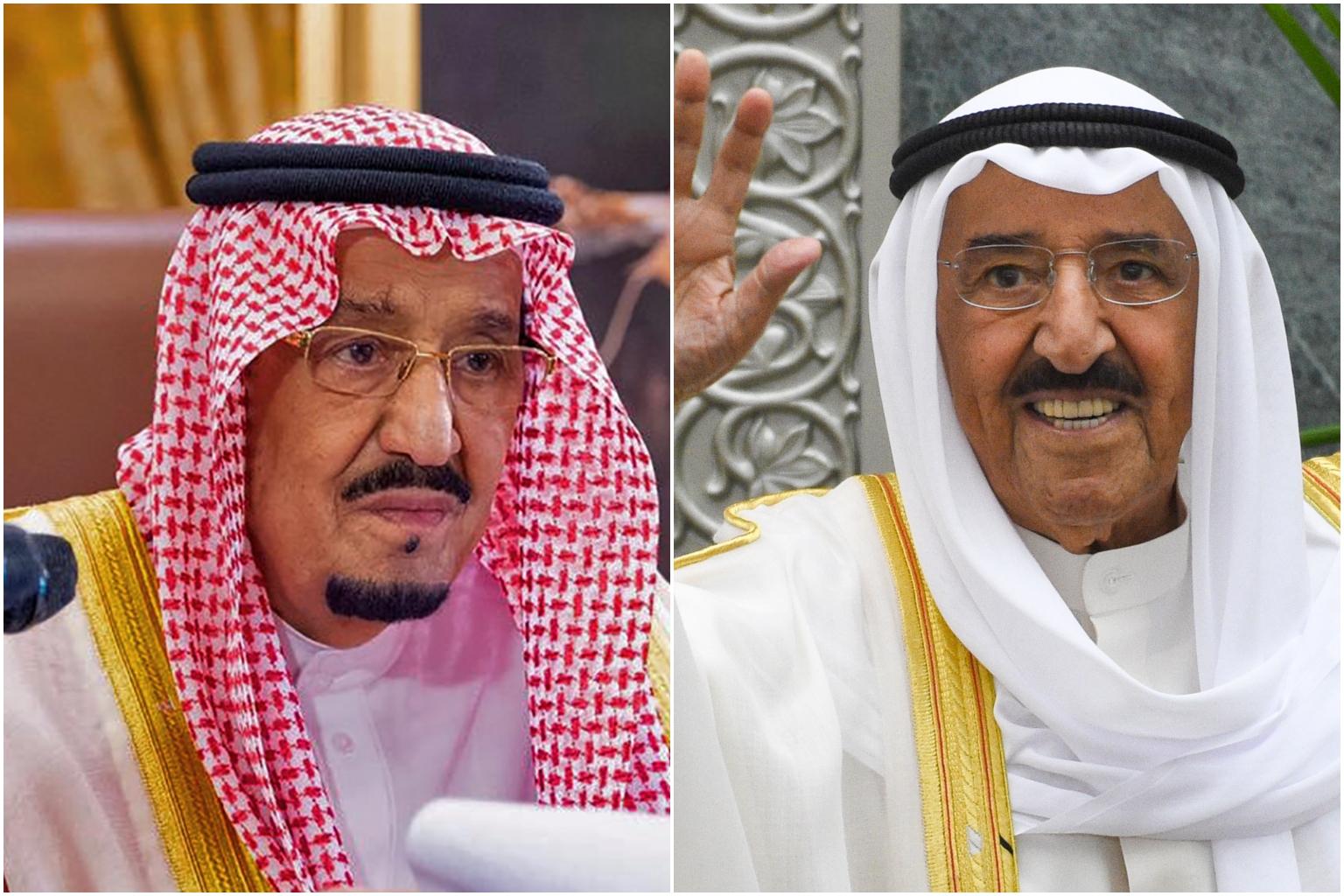Kuwait's anxieties over succession add to economy woes
Sign up now: Get ST's newsletters delivered to your inbox

The Arab world's two oldest heads of state King Salman bin Abdulaziz (left) and Kuwaiti emir Sheikh Sabah Al-Ahmed Al-Sabah (right) were hospitalised less than a week apart.
PHOTO: AFP, EPA-EFE
LONDON - Even in the best of times, the failing health of an ageing monarch can cause anxiety for their subjects.
That doubles during a period of economic hardship - and double again when the succession is unclear.
The Arab world's two oldest heads of state were hospitalised, less than a week apart, while their countries are both struggling with the twin economic blows of the coronavirus pandemic and low oil prices.
But although Saudis know exactly what to expect in the event King Salman bin Abdulaziz, 84, is called by a higher authority, the Kuwaiti succession after current emir Sheikh Sabah Al-Ahmed Al-Sabah, 91, is less clear.
The uncertainty has manifested in telling ways.
On the day of the emir's hospitalisation, which was announced with little explanation, the governor of the Kuwaiti central bank felt it necessary to issue a statement noting the strength and stability of the dinar.
On the day after Sheikh Sabah underwent what was described as "successful surgery" - again, without detail - the Premier Market index of the biggest and most liquid shares fell 1.2 per cent.
According to a minister of the royal court, Crown Prince Sheikh Nawaf Al-Ahmed Al-Sabah has temporarily assumed some of the emir's responsibilities.
Sheikh Nawaf is 83, and has held a number of positions in the government of his half-brother.
Yet he has neither the profile nor the power of his opposite number in Riyadh: Prince Mohammed bin Salman, 34, has been the de facto ruler of Saudi Arabia since he was named crown prince three years ago.
Of course, Sheikh Nawaf is much less controversial than Prince Mohammed.
While the Saudi scion's international reputation has been tainted by the murder of the journalist Jamal Khashoggi, among other things, the Kuwaiti crown prince is best remembered for helping to assemble the international coalition against the Iraqi invasion in 1990.
But, more germane to the moment, Sheikh Nawaf has had little involvement in the management of the Kuwaiti economy, whereas Prince Mohammed helms the "Vision 2030" plan to remake Saudi Arabia.
MBS, as he is commonly known, has been involved in every important economic change in the kingdom, from the introduction of VAT to the flotation of Saudi Aramco.
And while MBS has assiduously consolidated his power within the Saudi royal family by sidelining any potential challengers, Sheikh Nawaf has neither cause nor opportunity to do so.
Given his age, he is not expected to long outlast his half-brother.
The question of the generational passing of the torch in Kuwait thus remains unresolved. Will it pass directly to the next generation, as it did in Oman at the start of this year?
Or might it skip a generation, as with the Saudis?
In either event, it is not expected to pass smoothly.
A power struggle between the two major branches of the Kuwaiti ruling Sabah family, the Jaber and the Salem, is likely.
For more than two centuries, they have tended to alternate on the throne, but Sheikh Sabah broke with tradition by appointing Sheikh Nawaf, a fellow Jaber, to succeed him.
And the man tipped to be the next crown prince is also a Jaber: Sheikh Nasser Sabah, the eldest son of the ailing emir.
Sheikh Nasser is not a sure thing: He was fired as defence minister by his father late last autumn, after a public feud with another minister. He will likely face challengers from the Salem branch.
Already, there are whispers of maneuvering by both branches.
Uniquely for a Gulf monarchy, parliament will play a role in the succession, just as it did in the current emir's elevation in 2006.
Kuwaiti lawmakers are elected, and have considerable power - to block the government's ability to borrow funds, for instance.
The power play is taking place against a backdrop of economic uncertainty.
Like the other Gulf states, Kuwait is struggling to cope with low oil prices.
In May, at the height of the pandemic, Sheikh Sabah gave a televised warning against continued dependence on oil exports.
On the day of his surgery, S&P lowered its outlook for Kuwait's sovereign rating to negative from stable, citing the impact of oil production cuts amid the pandemic.
It expects the deficit to widen to almost 40 per cent of gross domestic product, compared with about 10 per cent in 2019. For Kuwaitis, it seems, anxiety over the succession is only one of a succession of anxieties.


